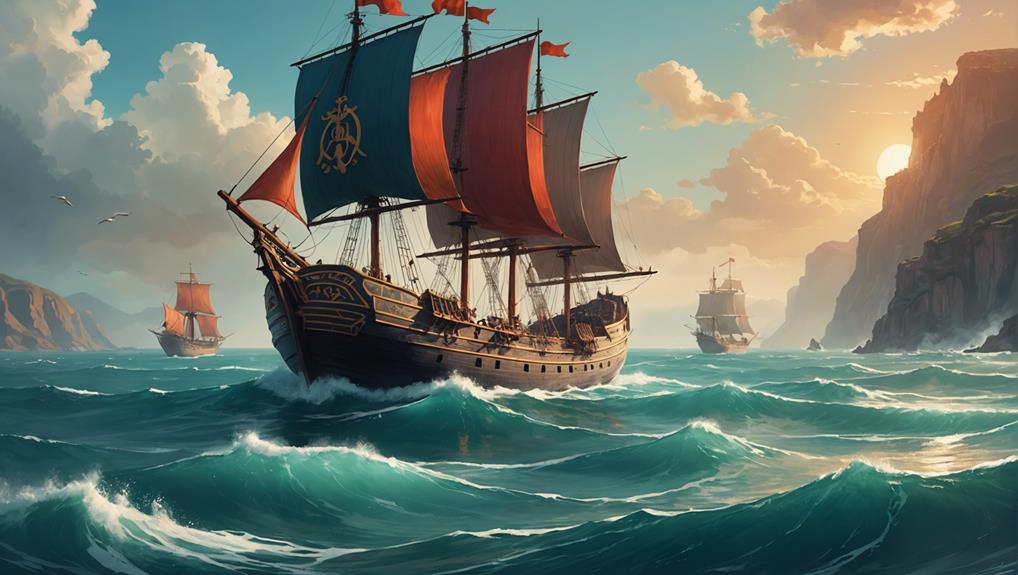Summary
- 1 Etymology of 'Phoenician'
- 2 Historical relevance
- 3 Cultural implications
- 4 Influential Trade and Commerce
- 5 Contributions in art and architecture
- 6 Language and Writing System
- 7 Perceptions of the past and present
- 8 Frequently asked questions
- 8.1 How did Phoenician civilization influence other ancient civilizations?
- 8.2 What were the main deities worshipped by the Phoenicians?
- 8.3 Did the Phoenicians have famous explorers or adventurers?
- 8.4 What were the main causes of the decline of Phoenician civilization?
- 8.5 How did Phoenician art differ from other ancient Mediterranean cultures?
Learn the term 'Phoenician,' derived from the ancient Greek 'Phoinikes,' to describe the coastal inhabitants of the Eastern Mediterranean. These hardworking people originated from city-state such as Tyre, Sidon, and Biblo, excelling in navigation, trade, and art. A crucial force in the creation of Mediterranean trade routes, their legacy resonates in trade and cultural exchange. Their influence on societies through trade, art and language persists, shaping global communication. Delve into the rich historical texture of Phoenician civilization to reveal a world steeped in commerce, culture and innovation.
Etymology of 'Phoenician'

When exploring the etymology of 'Phoenician', it is fascinating to delve into the origins of this ancient term. The term 'Phoenician' is derived from the ancient Greek word 'Phoinikes', which referred to the people who inhabited the coastal areas of the Eastern Mediterranean around present-day Lebanon, Syria and northern Israel. The Greeks derived the term from the Egyptian word 'fnḫw,' meaning 'purple,' in reference to the renowned production of purple dye Of the Phoenicians.
Interestingly, the Phoenicians did not call themselves by that name. Instead, they identified themselves by the names of their individual city-state, such as Tyre, Sidon or Biblo. The term 'Phoenician' as we understand it today was a label imposed by outsiders.
The legacy of the Phoenicians as skilled sailors, merchants and artisans endures to this day. Their contributions to navigation, trade and the spread of the alphabet have left an indelible imprint on the history of civilization.
Historical relevance
Let us examine the historical significance of the Phoenician culture. Ancient Phoenicia played a vital role in establishing trade routes across the Mediterranean, influencing trade and cultural exchange. In addition, the Phoenician alphabet system is considered one of the earliest forms of writing that influenced the development of other writing systems.
Ancient trade routes
Investigating the ancient trade routes of the Phoenicians reveals their profound historical importance in shaping global trade. The Phoenicians, known as skilled navigators and traders, established a vast network of maritime trade routes that connected the Mediterranean with distant lands, influencing economies and cultures throughout the ancient world.
To understand the impact of Phoenician trade, we explore a comparison of their main trade routes:
| Commercial Route | Meaning |
|---|---|
| Mediterranean Basin | It connected Phoenician cities to other Mediterranean cultures, facilitating the exchange of goods and ideas. |
| Red Sea | It provided access to luxury goods such as spices, precious metals and gemstones from the Arabian Peninsula and Africa. |
| Black Sea | It allowed trade with regions rich in grain, timber and metals, contributing to the economic prosperity of the Phoenicians. |
| Atlantic Ocean | It expanded their reach to the British Isles, facilitating trade in tin and other valuable resources. |
| Indian Ocean | It reached as far as the Indian subcontinent, establishing trade links with exotic goods such as silk and spices. |
These trade routes not only fueled the Phoenician economy, but also influenced the development of trade and cultural exchange in the ancient world.
Alphabet Development
Investigating the historical significance of the development of the Phoenician alphabet reveals a fundamental transformation in communication methods during antiquity. The Phoenician alphabet, dating from about 1050 B.C., served as the basis for many modern alphabets and played an essential role in shaping written communication. Here are four key points that highlight the importance of the development of the Phoenician alphabet:
- Simplicity in Scripture: The Phoenician alphabet was one of the earliest phonetic writing systems, in which symbols represented sounds, making it easier to learn and adopt than logographic systems.
- Cultural Exchange: The spread of the Phoenician alphabet through trade routes facilitated cultural exchange and influenced the development of various other writing systems, including Greek and Latin.
- Advancing Literacy: By simplifying writing, the Phoenician alphabet contributed to the increase in literacy rates, enabling a wider dissemination of knowledge and ideas.
- Historical Documentation: The adoption of the Phoenician alphabet by different civilizations led to improved record keeping, preserving historical events and knowledge for future generations.
Cultural implications

We investigate the cultural implications of Phoenician history, delving into its historical significance, symbolism and influence. Understanding how Phoenician culture was intertwined with trade, art and language can offer valuable perspectives on ancient civilizations. By examining these aspects, we can appreciate the lasting impact Phoenician culture had on the world.
Historical relevance
Throughout history, Phoenician civilization has left a lasting cultural legacy that continues to shape our understanding of ancient Mediterranean societies. The historical significance of the Phoenicians is profound and extends beyond their maritime prowess and trade networks. Here are four key ways in which the Phoenicians influenced history:
- Trade and commerce: Phoenicia's seafaring experience and extensive trade routes played a crucial role in the exchange of goods and ideas throughout the ancient world.
- Alphabet: The Phoenician alphabet, with its innovative use of symbols representing sounds, became the basis for many modern writing systems, including the Greek and Latin alphabets.
- Cultural exchange: Phoenician colonies established throughout the Mediterranean facilitated cultural exchange, influencing art, architecture, and religious practices in the region.
- Legacy in artisans: Phoenician craftsmen were renowned for their mastery of glass, metal, and textile work, establishing a standard of craftsmanship that endured for centuries.
Symbolism and Influence
As we investigate the cultural implications of Phoenician symbolism and influence, it is fascinating to discover how their artistic expressions resonated through the ancient world, leaving a lasting imprint on various aspects of Mediterranean societies. The Phoenicians were renowned for their craftsmanship, visible in their use of symbols such as the Caduceus, which later influenced Greek and Roman iconography. Their mastery in the production of purple dyes not only symbolized royalty and luxury, but also became a symbol of status in many ancient cultures.
In addition, Phoenician trade networks extended their influence far and wide, spreading their symbols and artistic styles throughout the Mediterranean. The use of the Phoenician alphabet, a precursor to many modern alphabets, demonstrates their enduring influence on written communication. Their maritime experience and navigational skills not only influenced trade, but also had an impact on the development of navigation techniques in the ancient world.
Influential Trade and Commerce
Trade greatly influenced the development and prosperity of Phoenician society. The Phoenicians were renowned traders who sailed across the Mediterranean, establishing colonies and networks that shaped their civilization. Here are four key ways in which trade influenced Phoenician society:
- Economic Power: Through their extensive trade networks, the Phoenicians accumulated wealth and became a dominant economic force in the ancient world.
- Cultural Exchange: Trade enabled the Phoenicians to interact with various civilizations, leading to the exchange of ideas, technologies, and cultural practices.
- Maritime Competence: The Phoenicians' success in trade was due in part to their advanced knowledge of navigation, shipbuilding and sea routes.
- Acquisition of Resources: Trade routes enabled the Phoenicians to acquire valuable resources such as metals, timber, and precious goods, which further fueled their economic growth and influence.
The Phoenicians' expertise in trade not only strengthened their economy, but also played a significant role in shaping their society and leaving a lasting imprint on the ancient world.
Contributions in art and architecture

Amidst the hectic trade routes and flourishing trade, the Phoenicians have left a lasting legacy through their significant contributions to art and architecture. Known for their skillful craftsmanship, Phoenician art often presented vibrant colors, intricate patterns, and detailed carvings on various media such as ceramics, ivory, and metalwork. Their skilled craftsmen created beautiful jewelry, statues, and intricate glassware that were highly sought after in the ancient world.
In architecture, the Phoenicians were pioneers in designing and building innovative structures. They were known for their skillful masonry work, using techniques such as crowning and pillar-and-beam construction. Phoenician cities boasted impressive city walls, temples, and palaces that showcased their architectural skill. The most famous example is the city of Carthage, with its large buildings and harbors that reflected Phoenician architectural influence.
Language and Writing System
Delving into the cultural depths of the Phoenicians reveals one fascinating aspect: their language and sophisticated writing system. That's what makes it so intriguing:
- Alphabet Pioneers: The Phoenicians are credited with the development of one of the earliest alphabets, consisting of 22 consonant letters. This alphabet became the basis for many modern writing systems.
- Simplicity and Adaptability: The Phoenician script was simple and adaptable, making it suitable for different languages. It influenced ancient Greek, Latin and Hebrew writing systems.
- Writing on Papyrus: The Phoenicians used papyrus, a durable material derived from reeds, for their writings. This choice helped preserve many of their texts over time.
- Business Communication: The Phoenician writing system was mainly used for commercial purposes, facilitating trade and record keeping across the Mediterranean region.
The Phoenician language and writing system played an essential role in the spread of knowledge and communication, leaving a lasting imprint on the development of written languages around the world.
Perceptions of the past and present

Investigating the legacy and contemporary perceptions of the Phoenicians reveals a varied landscape of influence and fascination that still engages scholars and enthusiasts. The legacy of the Phoenicians is far-reaching, with their advances in navigation, trade and craftsmanship leaving an indelible mark on history.
| Legacy | Modern perceptions |
|---|---|
| Maritime pioneers | Mysticism and Intrigue |
| Masters of purple color | Symbol of Resilience |
| Phonetic alphabet | Innovation and Progress |
| Cultural diffusion | Connection to the Past |
Their reputation as maritime pioneers and masters of the color purple gave them an aura of mystique and resilience. The legacy of the Phoenicians lives on through their contribution to the phonetic alphabet, a tool of innovation and progress still in use today. Moreover, their role in cultural diffusion has created an enduring link to the past, shaping modern perceptions of Phoenician civilization. The Phoenicians continue to captivate minds with their ingenuity and influence, making their legacy an eternal source of inspiration.
Frequently asked questions
How did Phoenician civilization influence other ancient civilizations?
The Phoenician influence on ancient civilizations was vast. They were skilled sailors, traders and craftsmen. Their alphabet spread across the Mediterranean, influencing languages such as Greek and Latin. They founded colonies, sharing their culture and knowledge. Through trade, they introduced new goods and ideas, shaping economies and societies. Their legacy can be seen in the architecture, art and even religious practices of other ancient cultures. The Phoenicians truly left a lasting imprint on the ancient world.
What were the main deities worshipped by the Phoenicians?
As for the main gods worshipped by the Phoenicians, you will find a rich pantheon. Baal, the god of storms and fertility, was a significant figure. Astarte, the goddess of love and war, was also widely revered. Melqart, associated with the city of Tyre, was another important deity. These gods played vital roles in Phoenician religion and influenced their culture and daily life.
Did the Phoenicians have famous explorers or adventurers?
Yes, the Phoenicians had renowned explorers and adventurers who were skilled sailors. They were reckless in their maritime activities and made significant discoveries. These pioneers played an essential role in expanding Phoenician trade networks and establishing colonies throughout the Mediterranean. Their voyages were instrumental in spreading Phoenician influence far and wide, making them a respected seafaring civilization in antiquity.
What were the main causes of the decline of Phoenician civilization?
The decline of Phoenician civilization was mainly caused by a combination of factors. These included invasions by foreign powers, internal political struggles, economic challenges due to competition from other trading powers, and natural disasters such as earthquakes. These factors gradually weakened their influence and led to the decline of their once thriving civilization. It is fascinating how various elements intertwined to shape the course of Phoenician history and influence their decline.
How did Phoenician art differ from other ancient Mediterranean cultures?
When you explore how Phoenician art differed from other ancient Mediterranean cultures, you will notice distinctive features such as vibrant colors, intricate designs, and a focus on practicality. Unlike some other societies that tended toward grandeur, Phoenician art was more focused on functionality and a reflection of everyday life. Their expertise in glasswork and ivory carving set them apart, displaying a unique blend of beauty and utility that defined their artistic style.
